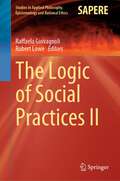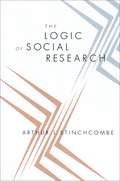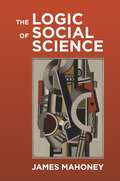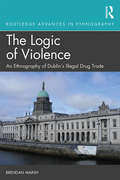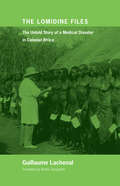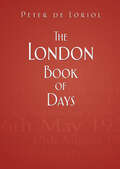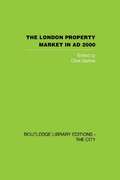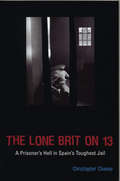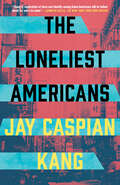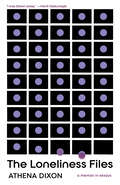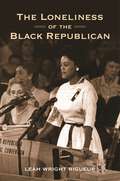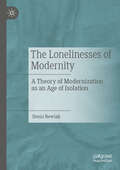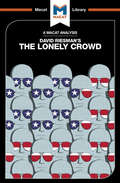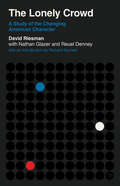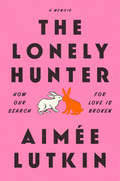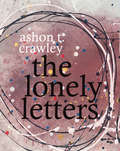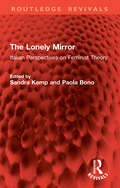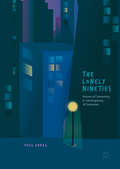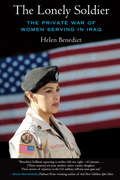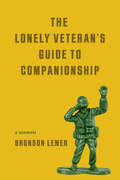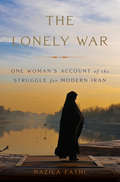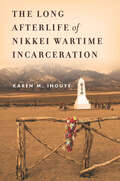- Table View
- List View
The Logic of Social Practices II (Studies in Applied Philosophy, Epistemology and Rational Ethics #68)
by Raffaela Giovagnoli Robert LoweThis book reports on cutting-edge research concerning social practices. Merging perspectives from various disciplines, including philosophy, biology, psychology and cognitive science, and economy, it discusses theoretical aspects of social behavior along with models to investigate them, and presenting key case studies as well. Further, it describes concepts related to habits, routines, and rituals and examines important features of human action, such as intentionality and choice, exploring the influence of specific social practices in different situations. Based on a workshop held on April 2022 at the World Congress on Universal Logic (UNILOG 22), in Crete, and including additional invited chapters, the book offers fresh insights into the fields of social practice and the cognitive, computational, and philosophical tools to understand them.
The Logic of Social Research
by Arthur L. StinchcombeArthur L. Stinchcombe has earned a reputation as a leading practitioner of methodology in sociology and related disciplines. Throughout his distinguished career he has championed the idea that to be an effective sociologist, one must use many methods. This incisive work introduces students to the logic of those methods. The Logic of Social Research orients students to a set of logical problems that all methods must address to study social causation. Almost all sociological theory asserts that some social conditions produce other social conditions, but the theoretical links between causes and effects are not easily supported by observation. Observations cannot directly show causation, but they can reject or support causal theories with different degrees of credibility. As a result, sociologists have created four main types of methods that Stinchcombe terms quantitative, historical, ethnographic, and experimental to support their theories. Each method has value, and each has its uses for different research purposes. Accessible and astute, The Logic of Social Research offers an image of what sociology is, what it's all about, and what the craft of the sociologist consists of.
The Logic of Social Science
by James MahoneyA groundbreaking logic-based approach to bridging the scientific-constructivist divide in social scienceThe Logic of Social Science offers new principles for designing and conducting social science research. James Mahoney uses set-theoretic analysis to develop a fresh scientific constructivist approach that avoids essentialist biases in the production of knowledge. This approach recognizes that social categories depend on collective understandings for their existence, but it insists that this recognition need not hinder the use of explicit procedures for the rational assessment of truth. Mahoney shows why set-theoretic analysis enables scholars to avoid the pitfalls of essentialism and produce findings that rest on a firm scientific foundation.Extending his previous work and incorporating new material, Mahoney presents specific tools for formulating and evaluating theories in the social sciences. Chapters include discussions of models of causality, procedures for testing propositions, tools for conducting counterfactual and sequence analysis, and principles for knowledge accumulation. Equal focus is placed on theory building and explanatory tools, including principles for working with general theoretical orientations and normative frameworks in scientific research. Mahoney brings a novel perspective to understanding the relationship among actors, social rules, and social resources, and he offers original ideas for the analysis of temporality, critical events, and path dependence.Bridging the rift between those who take a scientific approach and those who take a constructivist one, The Logic of Social Science forges an ambitious way forward for social science researchers.
The Logic of Violence in Civil War
by Stathis N. KalyvasThis book demonstrates that there is logic to violence in civil war.
The Logic of Violence: An Ethnography of Dublin's Illegal Drug Trade (Routledge Advances in Ethnography)
by Brendan MarshViolence is widely associated with illegal drug markets, and is one of the features that can differentiate illegal capitalism from legitimate business. This book explores the perceived causes and functions of violence in an illegal drug market in Dublin City, Ireland. Understanding why violence occurs amongst participants in illegal drug markets is an ongoing part of the criminological endeavour. Scholars debate the various business and personal factors that contribute towards violent perpetration. Complex aspects of participants’ lives, such as addictive disorders, socioeconomic status, and socialisation, add further complexity. This book examines violence in an illegal drug market from the perspectives of those who had participated in it, that is, formerly addicted people as well as former profit-oriented drug dealers. The text is the result of the first ethnographic study of an illegal drug market in Dublin. This book will appeal to undergraduate and postgraduate students, as well as scholars interested in the criminology and psychology of violence. More specifically, the book will be relevant to those interested in the areas of illegal drug markets, gang studies, the intersection of drugs and crime, and desistance from crime.
The Lomidine Files: The Untold Story of a Medical Disaster in Colonial Africa
by Guillaume LachenalTracing the nightmarish effects of the "wonder drug" Lomidine in preventing sleeping sickness in Africa.Winner of the George Rosen Prize by the American Association for the History of MedicineAfter the Second World War, French colonial health services, armed with a newly discovered drug, made the eradication of sleeping sickness their top priority. A single injection of Lomidine (known as Pentamidine in the United States) promised to protect against infection for six months or longer. Mass campaigns of "preventive lomidinization" were launched with immense enthusiasm across Africa. But the drug proved to be both inefficient and dangerous. Contaminated injections caused bacterial infections that progressed to gangrene, killing dozens of people. Shockingly, the French physicians who administered the shots seemed to know the drug’s risk: while they obtained signed consent before giving Lomidine to French citizens, they administered it to Africans without their consent—sometimes by force.In The Lomidine Files, Guillaume Lachenal traces the medicine’s trajectory from experimental trials during the Second World War, when it was introduced as a miracle cure for sleeping sickness, to its abandonment in the late 1950s, when a series of deadly incidents brought lomidinization campaigns to a grinding halt. He explores colonial doctors’ dangerously hubristic obsession with an Africa freed from disease and describes the terrible reactions caused by the drug, the resulting panic of colonial authorities, and the decades-long cover-up that followed.A fascinating material history that touches on the drug’s manufacture and distribution, as well as the tragedies that followed in its path, The Lomidine Files resurrects a nearly forgotten scandal. Ultimately, it illuminates public health not only as a showcase of colonial humanism and a tool of control but also as an arena of mediocrity, powerlessness, and stupidity.
The Lomidine Files: The Untold Story of a Medical Disaster in Colonial Africa
by Guillaume LachenalThis prize-winning study examines the nightmarish effects of the so-called “wonder drug” in preventing sleeping sickness in Africa.After the Second World War, French colonial health services set out to eradicate sleeping sickness in Africa. The newly discovered drug Lomidine (also known as Pentamidine) promised to protect against infection, and mass campaigns of “preventive lomidinization” were launched across Africa. But the drug proved to be both inefficient and dangerous. In numerous cases, it led to fatality.In The Lomidine Files, Guillaume Lachenal traces the medicine’s trajectory from experimental trials during the Second World War to its abandonment in the late 1950s. He explores colonial doctors’ dangerous obsession with an Africa freed from disease and describes the terrible reactions caused by the drug, the resulting panic of colonial authorities, and the decades-long cover-up that followed.A fascinating material history that touches on the drug’s manufacture and distribution, as well as the tragedies that followed in its path, The Lomidine Files resurrects a nearly forgotten scandal. Ultimately, it illuminates public health not only as a showcase of colonial humanism and a tool of control but also as an arena of mediocrity, powerlessness, and stupidity.Winner of the George Rosen Prize by the American Association for the History of Medicine
The London Book of Days (Book of Days)
by Peter LoriolTaking you through the year day by day, The London Book of Days contains quirky, eccentric, amusing and important events and facts from different periods of history, many of which had a major impact on the religious and political history of Britain as a whole. Ideal for dipping into, this addictive little book will keep you entertained and informed. Featuring hundreds of snippets of information gleaned from the vaults of London’s archives, it will delight residents and visitors alike.
The London Property Market in AD 2000
by Clive DarlowThis unique forcast of the shape of the property market of the future includes 22 individual research contributions by leading private practice, institutional and academic research departments and by other expert commentators. All the major components of the property mix - retail, commercial, industrial, residential and leisure - are considered in detail. Leading professionals also give their views on the investment strategies of the future, funding options, public sector involvement, property management and agency practice. Although this research concentrates on London and the South East of England the trends it reveals and the options it suggests are relevant to all major conurbations. There are important lessons here for every property professional, wherever based. This book was first published in 1986.
The Lone Brit on 13: A Prisoner's Hell in Spain's Toughest Jail
by Christopher ChanceThe Lone Brit on 13 is a gripping true story of violence, degradation and adventure penned in the confines of a grim Malaga prison cell. Imprisoned for drug-smuggling, the lone Brit on Wing 13, Chance, reveals the horrors he experienced among cut-throat villains and screws in the netherworld of the Spanish prison system.Chance takes to writing in his dank prison cell in an attempt to escape his surroundings and recalls various episodes in his life: his time serving as a soldier in Thailand and Malaysia; his involvement with the 3 Para snatch-squad in the 1970s Belfast; and his subsequent descent into drug dealing and trafficking, which culminated in a high-speed boat chase and his imprisonment in a top-security Spanish prison. While inside, Chance fought his way to the surface of a cesspool of iniquitous scumbags using his fists: the only effective means of being understood in an environment of desecrated morality and non-existent integrity. With predators lurking everywhere, Chance had to be constantly on guard and in order to survive he had to be mentally prepared to inflict the necessary violent retribution on any would-be attacker or racist thug. As the sole British inmate, Chance was a prime target for the intimidating Spanish hardmen who thrived on cruelty and treachery. But his martial arts skills and Samurai philosophy proved to be more than a match for the aggressors. Once a respected and successful businessman admired by his peers - he had operated his own martial arts business in Spain before being jailed - Chance took one wrong turn in life and lost everything except the love and support of his loyal wife.
The Loneliest Americans
by Jay Caspian KangA riveting blend of family history and original reportage that explores—and reimagines—Asian American identity in a Black and white world&“A smart, vulnerable, and incisive exploration of what it means for this brilliant and honest writer—a child of Korean immigrants—to assimilate and aspire while being critical of his membership in his community of origin, in his political tribe, and in America.&”—Min Jin Lee, author of Pachinko In 1965, a new immigration law lifted a century of restrictions against Asian immigrants to the United States. Nobody, including the lawmakers who passed the bill, expected it to transform the country&’s demographics. But over the next four decades, millions arrived, including Jay Caspian Kang&’s parents, grandparents, aunts, and uncles. They came with almost no understanding of their new home, much less the history of &“Asian America&” that was supposed to define them. The Loneliest Americans is the unforgettable story of Kang and his family as they move from a housing project in Cambridge to an idyllic college town in the South and eventually to the West Coast. Their story unfolds against the backdrop of a rapidly expanding Asian America, as millions more immigrants, many of them working-class or undocumented, stream into the country. At the same time, upwardly mobile urban professionals have struggled to reconcile their parents&’ assimilationist goals with membership in a multicultural elite—all while trying to carve out a new kind of belonging for their own children, who are neither white nor truly &“people of color.&” Kang recognizes this existential loneliness in himself and in other Asian Americans who try to locate themselves in the country&’s racial binary. There are the businessmen turning Flushing into a center of immigrant wealth; the casualties of the Los Angeles riots; the impoverished parents in New York City who believe that admission to the city&’s exam schools is the only way out; the men&’s right&’s activists on Reddit ranting about intermarriage; and the handful of protesters who show up at Black Lives Matter rallies holding &“Yellow Peril Supports Black Power&” signs. Kang&’s exquisitely crafted book brings these lonely parallel climbers together amid a wave of anti-Asian violence. In response, he calls for a new form of immigrant solidarity—one rooted not in bubble tea and elite college admissions but in the struggles of refugees and the working class.
The Loneliness Files
by Athena Dixon“I was blown away not only by the writing, but by the adventurous and expansive concept stretched out across these essays. The Loneliness Files has a real opportunity to reshape and redefine what a cohesive, braided, essay collection can be.”—Hanif Abdurraqib, Tin House Editor-at-Large What does it mean to be a body behind a screen, lost in the hustle of an online world? In our age of digital hyper-connection, Athena Dixon invites us to consider this question with depth, heart, and ferocity, investigating the gaps that technology cannot fill and confronting a lifetime of loneliness. Living alone as a middle-aged woman without children or pets and working forty hours a week from home, more than three hundred fifty miles from her family and friends, Dixon begins watching mystery videos on YouTube, listening to true crime podcasts, and playing video game walk-throughs just to hear another human voice. She discovers the story of Joyce Carol Vincent, a woman who died alone, her body remaining in front of a glowing television set for three years before the world finally noticed. Searching for connection, Dixon plumbs the depths of communal loneliness, asking essential questions of herself and all of us: How have her past decisions left her so alone? Are we, as humans, linked by a shared loneliness? How do we see the world and our place in it? And finally, how do we find our way back to each other? Searing and searching, The Loneliness Files is a groundbreaking memoir in essays that ultimately brings us together in its piercing, revelatory examination of how and why it is that we break apart.
The Loneliness of the Black Republican: Pragmatic Politics and the Pursuit of Power (Politics and Society in Modern America #122)
by Leah Wright RigueurThe story of black conservatives in the Republican Party from the New Deal to Ronald ReaganCovering more than four decades of American social and political history, The Loneliness of the Black Republican examines the ideas and actions of black Republican activists, officials, and politicians, from the era of the New Deal to Ronald Reagan's presidential ascent in 1980. Their unique stories reveal African Americans fighting for an alternative economic and civil rights movement—even as the Republican Party appeared increasingly hostile to that very idea. Black party members attempted to influence the direction of conservatism—not to destroy it, but rather to expand the ideology to include black needs and interests.As racial minorities in their political party and as political minorities within their community, black Republicans occupied an irreconcilable position—they were shunned by African American communities and subordinated by the GOP. In response, black Republicans vocally, and at times viciously, critiqued members of their race and party, in an effort to shape the attitudes and public images of black citizens and the GOP. And yet, there was also a measure of irony to black Republicans' "loneliness": at various points, factions of the Republican Party, such as the Nixon administration, instituted some of the policies and programs offered by black party members. What's more, black Republican initiatives, such as the fair housing legislation of senator Edward Brooke, sometimes garnered support from outside the Republican Party, especially among the black press, Democratic officials, and constituents of all races. Moving beyond traditional liberalism and conservatism, black Republicans sought to address African American racial experiences in a distinctly Republican way.The Loneliness of the Black Republican provides a new understanding of the interaction between African Americans and the Republican Party, and the seemingly incongruous intersection of civil rights and American conservatism.
The Lonelinesses of Modernity: A Theory of Modernization as an Age of Isolation
by Denis NewiakModernity presents itself as an age of increasing social disintegration: secularization and rationalization, urbanization and globalization, individualization and digitalization make it difficult for communities today. Modernity comes with desirable promises that make it attractive, but it does not come free: Its price is escalating modern loneliness. Denis Newiak tells a cultural history of modernization that, from industrialization to the late-modern network society, produces ever new and harsher experiences of loneliness.
The Lonely Crowd: A Study of the Changing American Character
by Jarrod HomerDavid Riesman’s The Lonely Crowd: A Study in the Changing American Character is one of the best-known books in the history of sociology – holding a mirror up to contemporary America and showing the nation its own character as it had never seen it before. Its success is a testament to Riesman’s mastery of one key critical thinking skill: interpretation. In critical thinking, interpretation focuses on understanding the meaning of evidence, and is frequently characterized by laying down clear definitions, and clarifying ideas and categories for the reader. All these processes are on full display in The Lonely Crowd – which, rather than seeking to challenge accepted wisdom or generate new ideas, provides incisive interpretations and definitions of ideas and data from a variety of sources. Above all, Riesman’s book is a work of categorization – a form of interpretation that can be vital to building and communicating systematic arguments. With the aid of his two co-authors (Nathan Glazer and Reuel Denney), he defined three cultural types that formed a perfect pattern for understanding mid-century American society and the changes it was undergoing. The clarity of the book’s definitions tapped directly into the zeitgeist of the 1950s, powering it to best-seller status and an audience that extended far beyond academia.
The Lonely Crowd: A Study of the Changing American Character (Veritas Paperbacks)
by Nathan Glazer David Riesman Reuel Denney&“One of the most important books of the twentieth century.&”—Gideon Lewis-Kraus, New Yorker Considered by many to be one of the most influential books of the twentieth century, The Lonely Crowd opened exciting new dimensions in our understanding of the problems confronting the individual in twentieth-century America. Richard Sennett&’s new introduction illuminates the ways in which Riesman&’s analysis of a middle class obsessed with how others lived still resonates in the age of social media. &“Indispensable reading for anyone who wishes to understand American society. After half a century, this book has lost none of its capacity to make sense of how we live.&”—Todd Gitlin
The Lonely Hunter: How Our Search for Love Is Broken: A Memoir
by Aimée LutkinWhen can we say we&’ll be single forever—and that&’s okay? One woman questions our society&’s pathologizing of loneliness in this crackling, incisive blend of memoir and cultural reporting. &“The Lonely Hunter challenged everything I assumed about the nature of loneliness and what it means to lead an authentic life.&”—Doree Shafrir, author of Thanks for Waiting and Startup: A NovelONE OF THE MOST ANTICIPATED BOOKS OF 2022—Cosmopolitan, She ReadsOne evening, thirtysomething writer Aimée Lutkin found herself at a dinner party surrounded by couples. When the conversation turned to her love life, Lutkin stated simply, &“I don&’t really know if I&’m going to date anyone ever again. Some people are just alone forever.&” Her friends rushed to assure her that love comes when you least expect it and to make recommendations for new dating apps. But Lutkin wondered, Why, when there are more unmarried adults than ever before, is there so much pressure to couple up? Why does everyone treat me as though my real life won&’t start until I find a partner? Isn&’t this my real life, the one I&’m living right now? Is there something wrong with me, or is there something wrong with our culture? Over the course of the next year, Lutkin set out to answer these questions and to see if there really was some trick to escaping loneliness. She went on hundreds of dates; read the sociologists, authors, and relationship experts exploring singlehood and loneliness; dove into the wellness industrial complex; tossed it all aside to binge-watch Netflix and eat nachos; and probed the capitalist structures that make alternative family arrangements nearly impossible.Chock-full of razor-sharp observations and poignant moments of vulnerability, The Lonely Hunter is a stirring account of one woman&’s experience of being alone and a revealing exposé of our culture&’s deep biases against the uncoupled. Blazingly smart, insightful, and full of heart, this is a book for anyone determined to make, follow, and break their own rules.
The Lonely Letters
by Ashon T. CrawleyIn The Lonely Letters, A tells Moth: “Writing about and thinking with joy is what sustains me, daily. It nourishes me. I do not write about joy primarily because I always have it. I write about joy, Black joy, because I want to generate it, I want it to emerge, I want to participate in its constant unfolding.” But alongside joy, A admits to Moth, come loneliness, exclusion, and unfulfilled desire. The Lonely Letters is an epistolary blackqueer critique of the normative world in which Ashon T. Crawley—writing as A—meditates on the interrelation of blackqueer life, sounds of the Black church, theology, mysticism, and love. Throughout his letters, A explores blackness and queerness in the musical and embodied experience of Blackpentecostal spaces and the potential for platonic and erotic connection in a world that conspires against blackqueer life. Both a rigorous study and a performance, The Lonely Letters gestures toward understanding the capacity for what we study to work on us, to transform us, and to change how we inhabit the world.
The Lonely Mirror: Italian Perspectives on Feminist Theory (Routledge Revivals)
by Sandra Kemp Paola BonoContributing to a lively dialogue with Anglo-American and French theorists, The Lonely Mirror (originally published in 1993) sets out to contextualize Italian feminist theory within the international debate. The essays vividly illuminate the specific character of Italian feminism as a political and intellectual movement and expose the differences between the more institutionalized nature of women’s studies in the United States and Britain. It will be of vital interest both to general and academic readers who want to explore some of the most vibrant developments in European feminism.
The Lonely Nineties: Visions of Community in Contemporary US Television
by Paul ArrasThis book examines the most popular American television shows of the nineties—a decade at the last gasp of network television’s cultural dominance. At a time when American culture seemed increasingly fragmented, television still offered something close to a site of national consensus. The Lonely Nineties focuses on a different set of popular nineties television shows in each chapter and provides an in-depth reading of scenes, characters or episodes that articulate the overarching “ideology” of each series. It ultimately argues that television shows such as Seinfeld, Friends, Law & Order and The Simpsons helped to shape the ways Americans thought about themselves in relation to their friends, families, localities, and nation. It demonstrates how these shows engaged with a variety of problems in American civic life, responded to the social isolation of the age, and occasionally imagined improvements for community in America.
The Lonely Soldier: The Private War of Women Serving in Iraq
by Helen BenedictThe Lonely Soldier--the inspiration for the documentary The Invisible War--vividly tells the stories of five women who fought in Iraq between 2003 and 2006--and of the challenges they faced while fighting a war painfully alone.More American women have fought and died in Iraq than in any war since World War Two, yet as soldiers they are still painfully alone. In Iraq, only one in ten troops is a woman, and she often serves in a unit with few other women or none at all. This isolation, along with the military's deep-seated hostility toward women, causes problems that many female soldiers find as hard to cope with as war itself: degradation, sexual persecution by their comrades, and loneliness, instead of the camaraderie that every soldier depends on for comfort and survival. As one female soldier said, "I ended up waging my own war against an enemy dressed in the same uniform as mine."In The Lonely Soldier, Benedict tells the stories of five women who fought in Iraq between 2003 and 2006. She follows them from their childhoods to their enlistments, then takes them through their training, to war and home again, all the while setting the war's events in context. We meet Jen, white and from a working-class town in the heartland, who still shakes from her wartime traumas; Abbie, who rebelled against a household of liberal Democrats by enlisting in the National Guard; Mickiela, a Mexican American who grew up with a family entangled in L.A. gangs; Terris, an African American mother from D.C. whose childhood was torn by violence; and Eli PaintedCrow, who joined the military to follow Native American tradition and to escape a life of Faulknerian hardship. Between these stories, Benedict weaves those of the forty other Iraq War veterans she interviewed, illuminating the complex issues of war and misogyny, class, race, homophobia, and post-traumatic stress disorder. Each of these stories is unique, yet collectively they add up to a heartbreaking picture of the sacrifices women soldiers are making for this country.Benedict ends by showing how these women came to face the truth of war and by offering suggestions for how the military can improve conditions for female soldiers-including distributing women more evenly throughout units and rejecting male recruits with records of violence against women. Humanizing, urgent, and powerful, The Lonely Soldier is a clarion call for change.From the Hardcover edition.
The Lonely Veteran's Guide to Companionship (Living Out: Gay and Lesbian Autobiog)
by Bronson LemerIn this collection of interrelated essays, Bronson Lemer explores companionship through the lens of a queer veteran, focusing on the difficulty of forming true connections with others, including a “battle buddy” during basic training, the people he meets while teaching in China, and the spirit of a long-dead older sister. Lemer uses lessons from popular culture and literature—the globe-trotting exploits of fictional criminal Carmen Sandiego, the sexual exploration in Baldwin’s Giovanni’s Room, the expatriate longing in Hemingway’s A Moveable Feast, just to name a few—as a means to think more broadly about the role of the outsider and how we navigate aimlessness while searching for stability and meaning. Lemer’s distinct take on the veteran’s story boldly engages the intersection of military narratives and queer culture, including examinations into the role of thirst traps in contemporary dating culture, the fears of long-term health damage caused by military service, and the ways in which intimate relationships can lead to a loss of self. Taken together, his essays illustrate how one queer veteran managed to carve out a path that led him, however awkwardly at times, closer to the person he wanted to be.
The Lonely War: One Woman's Account of the Struggle for Modern Iran
by Nazila FathiAs a nine-year-old Tehrani schoolgirl during the Iranian Revolution, Nazila Fathi watched her country change before her eyes. The revolutionaries--most of them poor, uneducated, and radicalized--seized jobs, housing, and positions of power, transforming Iranian society practically overnight. But this socioeconomic revolution had an unintended effect. As Fathi shows, the forces unleashed in 1979 inadvertently created a robust Iranian middle class, one that today hungers for more personal freedoms and a renewed relationship with the outside world. And unless an international confrontation allows Iranian leaders to justify an internal crackdown, this internal pressure for reform will soon set the country on a more stable track. In The Lonely War, Fathi describes Iran’s awakening alongside her own, revealing how moderates are retaking the country--and how foreign powers can aid their progress.
The Long 2020 (21st Century Studies)
by Richard Grusin Maureen RyanSharply intelligent, often personal reflections on the global crises of 2020 that are still ongoing By all accounts, 2020 was the longest year in recent memory, as people in the United States and across the globe careened from one unfolding catastrophe to another. The consequences of this devastating year are sure to impact the planet for decades, if not centuries, to come. This collection considers the question of that long 2020 from the perspective of the lived experience of the year, its long and deep roots in various human and nonhuman pasts, and the transformation of our sense of the future.The Long 2020 assembles a strikingly interdisciplinary group of scholars and thinkers to address how the many crises of 2020—epidemiological, political, ecological, and social—have unfolded, examining both their origins as well as their ongoing effects. The contributors address questions of time, history, and scale as they have played out, and continue to play out; the relationship between home and environment, with a focus on architecture, breathing, and human–nonhuman relations; and the experience of cultural, political, and social life, deploying cultural and political theory to explore questions of race, gender and sexuality, and democracy.The global pandemic has still not abated, reflecting the need to rethink our interrelatedness to viruses and other species. In bringing together this diverse group of authors, The Long 2020 offers a variety of perspectives on the impacts of that fraught year, the effects of which continue to permeate daily life.Contributors: Stacy Alaimo, U of Oregon; Elisabeth Anker, George Washington U; Janelle Baker, Athabasca U, Alberta, Canada; Daniel A. Barber, U of Pennsylvania Weitzman School of Design; Adia Benton, Northwestern U; Levi R. Bryant, Collin College; Beatriz Colomina, Princeton U; William E. Connolly, Johns Hopkins U; Cary Gabriel Costello, U of Wisconsin–Milwaukee; Megan Craig, Stony Brook U; Wai Chee Dimock, Harvard U; Paulla Ebron, Stanford U; Nirmala Erevelles, U of Alabama; Roderick A. Ferguson, Yale U; Rosa E. Ficek, U of Puerto Rico at Cayey; Stefanie Fishel, U of the Sunshine Coast in Queensland; Jonathan Flatley, Wayne State U; Jennifer Gabrys, U of Cambridge; David Gissen, Parsons School of Design and the New School, New York; Dehlia Hannah, The Royal Danish Academy of Fine Arts; Karen Ho, U of Minnesota; Bonnie Honig, Brown U; Frédéric Keck, Laboratory of Social Anthropology (CNRS Paris); Eben Kirksey, Deakin Institute in Melbourne, Australia; Bernard C. Perley, U of British Columbia, Vancouver; Tom Rademacher; Renya Ramirez, U of California, Santa Cruz; Zoe Todd (Métis); Anna Tsing, U of California, Santa Cruz; Sarah E. Vaughn, U of California, Berkeley; Rebecca Wanzo, Washington U; McKenzie Wark, Eugene Lang College, New York City.
The Long Afterlife of Nikkei Wartime Incarceration
by Karen InouyeThe Long Afterlife of Nikkei Wartime Incarceration reexamines the history of imprisonment of U.S. and Canadian citizens of Japanese descent during World War II. Karen M. Inouye explores how historical events can linger in individual and collective memory and then crystallize in powerful moments of political engagement. Drawing on interviews and untapped archival materials--regarding politicians Norman Mineta and Warren Furutani, sociologist Tamotsu Shibutani, and Canadian activists Art Miki and Mary Kitagawa, among others--Inouye considers the experiences of former wartime prisoners and their on-going involvement in large-scale educational and legislative efforts. While many consider wartime imprisonment an isolated historical moment, Inouye shows how imprisonment and the suspension of rights have continued to impact political discourse and public policies in both the United States and Canada long after their supposed political and legal reversal. In particular, she attends to how activist groups can use the persistence of memory to engage empathetically with people across often profound cultural and political divides. This book addresses the mechanisms by which injustice can transform both its victims and its perpetrators, detailing the dangers of suspending rights during times of crisis as well as the opportunities for more empathetic agency.
